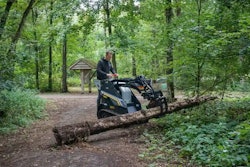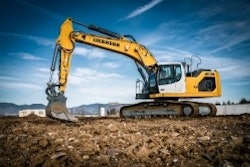It was the winter of 1996 and Mike Nadeau and Jeff Rehder had just been laid off their jobs working for a large commercial site developer.
Realizing they needed to create their own opportunity the two teamed up with another partner – someone they’ve since bought out – and started BNR Excavating. The first order of business: buying a new backhoe, dozer, dump truck and trailer. “We didn’t have a maintenance facility and we knew if we bought used, we’d be working on it all the time,” Mike says. “Downtime would bury us, so we bit the bullet and paid for new equipment.”
With Jeff’s utility experience and Mike’s dirt work expertise, the company started out by digging basements. Between the two of them, they felt they could handle whatever came up. Now they take pride in the diversity of their work, which includes demolition, site clearing, grading and utility installation. They contend it’s a selling point to general contractors wanting one firm – instead of three or four – to handle these items.
Client Larry Karkela with Karkela Construction, St. Louis Park, Minnesota, would agree. “BNR does their homework and they know their business,” he says. “They’ve become our favorite excavating contractor.”
Capturing costs
The union company, which operates in the Minneapolis/St. Paul greater metropolitan area, now has 33 employees, including four foremen. Jeff concentrates on operations and Mike does project management and estimating. The company divides its time between 33 percent negotiated and 70 percent low-bid work.
Shonna, who married Mike in 2001, joined the firm in 1999, first helping with the books. After finishing her accounting degree, she took over all office functions, working closely with the firm’s bank, CPA and attorney. She quickly made it her mission to ensure the company captured all of its costs on a project, which led BNR to convert its accounting software from a general to a contractor-specific system.
“Someone doesn’t say to you, ‘Here are your 122 contracts for the year,'” Shonna explains. “There’s no pro forma on how it’s going to happen. You don’t know when the contracts are coming in. You don’t know exactly when you’ll get paid. You don’t know when the job’s going to start or when it’s going to end, so there are all these variables to consider when budgeting a job.”
BNR has formed some key relationships along the way, including one with a small, local bank. “We found a bank open to the strategies and restructuring we wanted to use and they put their faith in us,” Shonna says. “It’s one of the key elements in having the flexibility to be able to buy something. They understand what we’re doing and – especially with excavating – that the first quarter here in Minnesota may not be great but the strong quarters are coming.”
Adds Mike: “They established a nice line of credit for us, which gave us some breathing room.”
BNR takes on a variety of jobs, including this site development work for a furniture store.
Tough without RPOs
BNR bought its first machines with a rental purchase option, a financial device the company has used consistently through its eight years in business. “RPOs helped us get into business; otherwise it would have been tough,” Mike comments. “They have made it easy for us to accumulate equipment.”
The firm no longer has a new-equipment-only policy. “If we know we’re not going to put many hours on a piece, we’ll buy a one- or two-year-old machine,” says Jeff, who oversees the company’s equipment fleet. “We’re selective when we buy used equipment so we don’t have to stick a lot of money into it right away.”
The company now operates a maintenance facility, and the Nadeaus have built a nearby house, which contains the company’s offices. Jeff oversees two shop mechanics. “We try to be self sufficient,” Jeff says, “and do our own track work, and pins and bushings, etc.” The shop operation has already paid for itself.
“We stress cleanliness to our operators,” Jeff says, “and they’re responsible for taking daily care of the equipment.” It’s a tenet of BNR that grease-laden equipment sends the wrong message. If a company has good-looking equipment, the three feel it means it takes pride in its work. And as a result of this attention to detail, “We didn’t have one day last year when a job sat because of a broken-down machine,” Mike says.
The firm’s present fleet includes seven 20- to 40-metric-ton excavators, used to dig utilities and footings; five 80- to 145-horsepower dozers for grading and site work; four skid steers and a compact excavator for small, tight jobs; a wheel loader; and a wheeled excavator for general, all-around work. Three trucks, one with a low boy, move the company’s equipment around. “We did more than 220 over-width equipment moves last year with the low boy alone,” Jeff says.
Constant pressure to grow
Although the three owners are comfortable where the company is now, they acknowledge there is constant pressure to grow. One main challenge is maintaining competitive pricing while increasing job productivity. “We’re continually inventing new strategies to prevent losses from daily operations,” Shonna says.
With annual revenues of $2.5 million in 2003, most BNR jobs are in the $100,000 to $150,000 price range. “We’re expecting to exceed $5 milllion in sales this year,” Shonna says. The company will still accept the small residential jobs it started out in business doing though, recognizing the larger jobs may not perhaps be the best money makers.
“It’s a credit to them how rapidly they’ve grown,” says Roger Miller with the St. Paul Builders Exchange. “They have a first-class operation and they’re building a good reputation.”







